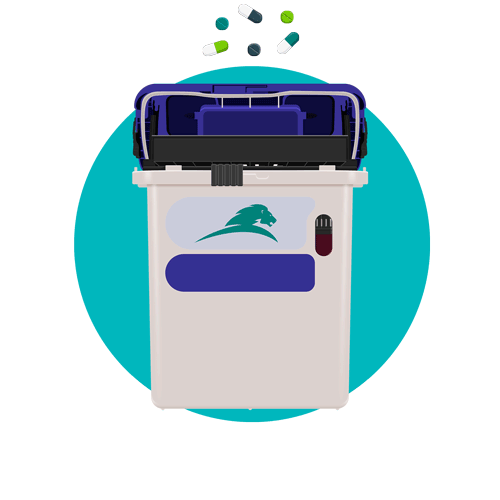Pharmaceutical Waste Regulations: Policy and Procedure

The safe and compliant disposal of pharmaceutical waste is a critical concern for healthcare facilities nationwide. As the industry evolves, so too do the standards and regulations governing the proper management of these materials. Daniels Health stands at the forefront of compliance with pharmaceutical waste policies and procedures.
Daniels offers comprehensive solutions that ensure security and efficiency in all facets of pharmaceutical waste compliance.
TOPICS WE WILL COVER:
2 / Regulatory Environment and Historical Development
3 / Types of Pharmaceutical Waste
4 / Daniels Health’s Waste Policy and Solutions
6 / Partner with Daniels for Compliant Pharmaceutical Waste Services
Standards and Regulations
In the United States, the management of medical and pharmaceutical waste is subject to stringent standards.
These regulations are designed to protect public health, safeguard the environment, and ensure the security of potentially hazardous materials. Daniels Health not only meets but exceeds these regulatory expectations, providing peace of mind for healthcare providers concerned with compliance and environmental stewardship.
Regulatory Environment and Historical Development
The regulatory landscape for waste management has seen significant development over the years, marked by key legislation such as the Medical Waste Tracking Act, a federal law in the United States enacted from 1988-1991 addressing the unlawful disposal of body tissues, blood waste, and other contaminated biological substances, and the Hazardous Materials Transportation Authorization Act, which governs all critical forms of transportation to mitigate the risks associated with transporting hazardous materials, whether by land, air, sea, or alternative means like pipelines.
Resource Conservation and Recovery Act (RCRA) and Controlled Substances Act
Compliant pharmaceutical waste processes require adherence to the Resource Conservation and Recovery Act (RCRA) and the Controlled Substances Act, overseen by the Environmental Protection Agency (EPA) and Drug Enforcement Administration (DEA), respectively.
Resource Conservation and Recovery Act
- RCRA allows the EPA to set federal guidelines for the safe management of hazardous waste, from its generation to disposal.
- It sets guidelines for both dangerous and non-dangerous waste, aiming for secure disposal methods.
- Public input is welcomed in shaping these waste management rules.
- States mainly handle regular trash following EPA standards for disposal sites.
- The EPA closely regulates hazardous waste, ensuring safe handling and disposal, with states sometimes overseeing this.
- RCRA also focuses on research, managing underground tanks, and medical waste rules.
- Key successes include better waste management systems, pollution prevention, and the promotion of recycling.
- Environmental protection, cleanup, sustainable waste practices, and embracing new tech for better waste handling are also primary concerns.
Controlled Substances Act
- The Controlled Substances Act sorts drugs into five groups based on their use, risk of abuse, and safety.
- It outlines how drugs can be added, moved, or removed from these groups.
- The DEA, health authorities, or public requests can initiate changes to a drug’s status.
- The act takes into consideration factors like abuse potential, scientific data, health risks, and addiction chances.
-
The goal is to manage drug use and safety while preventing abuse.
Types of Pharmaceutical Waste
Pharmaceutical waste, including expired, unused, or leftover medicines, is categorized into non-hazardous and hazardous waste, each with specific compliance requirements:
- Hazardous Waste Pharmaceuticals: In the most basic sense, these are wastes that are regulated by state or federal health authorities under RCRA. Pharmaceutical waste is considered hazardous if it is a listed hazardous waste or exhibits characteristics of hazardous waste—ignitability, corrosivity, toxicity, or reactivity. This waste requires strict disposal regulations, including incineration at approved facilities.
- Non-Hazardous Waste Pharmaceuticals: Broadly speaking, this is defined as any unwanted, contaminated, or expired medication that is not specifically listed as hazardous or exhibiting hazardous characteristics. Requires proper disposal to avoid environmental harm but follows less stringent regulations.
-
Controlled Substances: Any pharmaceutical or prescription medication scheduled by the Drug Enforcement Administration (DEA). Controlled substances can be either hazardous or non-hazardous, and no matter how these drugs are categorized, they require specialized containment – such as Rx Destroyer or Secure a Drug – that complies with all disposal requirements set forth by the DEA.
Chemotherapy Waste:
- Trace Chemotherapy Waste: Vials or containers that have less than 3% of the original contents by weight, after removing as much of the chemotherapy medicine as feasible and by normal means.
- Bulk Chemotherapy Waste: Chemo waste that exceeds 3% by volume and any container that held a p-listed chemotherapy waste.
Disposal Regulations:
- Compliance with RCRA, DOT, OSHA, and the Clean Water Act.
- Proper identification, segregation, and disposal practices are mandatory.
For more information regarding what constitutes pharmaceutical waste, visit our knowledge center.
Comprehensive Pharma Waste Management Strategies from Daniels Health
The Daniels Health team of specialists collaborates closely with each healthcare facility to examine, assess and optimize their pharmaceutical waste processes. We provide a comprehensive array of services tailored to effectively manage both hazardous and non-hazardous waste pharmaceuticals, ensuring the selection of the most cost-efficient collection, transportation and disposal methods.
Through our advanced waste classification portal, we offer clients the latest in drug inventory classifications, facilitating compliance with both state and federal regulations by generating detailed histories and reports of all medications collected and transported. Our approach guarantees streamlined pharmaceutical waste management for your facility, maintaining traceability at every stage.
Daniels Health Waste Policy and Solutions
Daniels Health has transformed the management of non-hazardous waste pharmaceuticals with the introduction of Pharmasmart, the industry’s first reusable waste container designed specifically for these substances. This innovation supports healthcare providers by ensuring compliance with regulatory standards, safeguarding them from liability associated with the disposal of pharmaceutical waste from generation to destruction.
The Pharmasmart's inbuilt security locks and lockable brackets also prevent unauthorized removal – setting a new standard in pharmaceutical waste management.
Unlike typical pharmaceutical waste containers, Daniels’ reusable Pharmasmart requires no assembly or secondary packaging. Its hands-free design and advanced safety features prevent container tampering and the theft of expired or partially used medications.
OUR PHARMACEUTICAL WASTE CONTAINER ENHANCES SAFETY THROUGH:
- Overfill protection – the disposal containers’ inbuilt safety tray restricts hand-access and overfilling
- Thoughtful design – featuring a gravity-sensitive medications disposal tray, with a large aperture and anti-bounce design
- In-built risk-minimizing safety features – Pharmasmart can safely be positioned in a patient environment
-
Mobile dual-segregation trolley design – enabling pharmaceutical disposal at the patient’s bedside
This innovative solution not only complies with stringent waste disposal regulations but also offers a sustainable alternative to traditional disposal methods. Partnering with Daniels Health allows healthcare facilities to achieve significant cost savings, enhance safety, and adopt more sustainable waste management practices.
The Daniels Difference
What sets Daniels Health apart is its commitment to providing fully managed services, employing industry-leading containment solutions and maintaining transparent contractual agreements.
The impact of adopting Daniels Health’s solutions is tangible, including reduced plastic waste and minimized waste-associated labor costs. These efforts reflect our dedication to safety, compliance and environmental sustainability.
The importance of compliant pharmaceutical waste management cannot be overstated. Healthcare facilities looking to improve their waste management practices are encouraged to consider the comprehensive services offered by Daniels Health. With a focus on safety, regulatory compliance and environmental responsibility, Daniels Health stands ready to meet the specific needs of the healthcare sector.
Partner With Daniels for Compliant Pharmaceutical Waste Services
The effective management of pharmaceutical waste is a complex but critical component of healthcare operations. Daniels Health offers a proven pathway to compliance, safety, and environmental stewardship, providing healthcare facilities with the tools they need to manage their waste responsibly.
